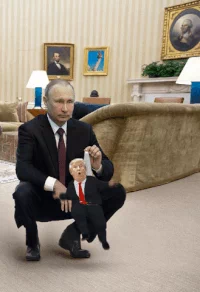 The
only redeeming aspect to Trump’s presidency is he brings us back to
basics. And what could be more basic than the difference between democracy
and dictatorship?
The
only redeeming aspect to Trump’s presidency is he brings us back to
basics. And what could be more basic than the difference between democracy
and dictatorship?
Democracy
is about means, not ends. If we all agreed on the ends (such as whether to
build a wall along the Mexican border) there’d be no need for democracy.
But
of course we don’t agree, which is why the means by which we resolve our
differences are so important. Those means include a Constitution, a
system of government based on the rule of law, and an independent
judiciary.
A
dictatorship, by contrast, is only about ends. Those ends are the goals of the
dictator – preserving and accumulating personal power. To achieve those ends, a
dictator will use any means necessary.
Which
brings us back to Trump.
The
conventional criticism of Trump is that he’s unfit to be president because he
continuously breaks the norms of how a president should behave.
Trump’s
norm-breaking is unsettling, to be sure, but Trump’s more fundamental offense
is he continuously sacrifices means in order to preserve and accumulate
personal power.
A
president who shuts down government in order to get his way on a controversial
issue, such as building a wall along the border with Mexico, and offering to
reopen it as a concession when his opponents give in, is not protecting
democracy.
He
is treating the government of the United States as a bargaining chip. He is
asserting power by any means possible. This is the method of a dictator.
A
president who claims he has an absolute right to declare a national emergency
and spend government funds that Congress has explicitly refused to appropriate
for the ends he seeks, is also assuming the role of a dictator.
A
president who spouts lies during a prime-time national television address over what
he terms an “undeniable crisis” at the southern U.S. border, which is in fact
no crisis at all, is using whatever means available to him to preserve and
build his base of power.
The
real international threat to America is not coming from Latin America. It is
coming from a foreign government intent on undermining our democracy by
propagating lies, turning Americans against each other, and electing a puppet
president.
We
do not know yet whether Trump colluded with Vladimir Putin to win the 2016
election. What we do know so far is that Trump’s aides and campaign manager
worked with Putin’s emissaries during the 2016 election, and that Putin sought
to swing the election in favor of Trump.
We
also know that since he was elected, Trump has done little or nothing to stop
Putin from continuing to try to undermine our democracy.
To the contrary, Trump has obstructed inquiries into Russian meddling, and gone out of his way to keep his communications with Putin secret, even from his own White House.
To the contrary, Trump has obstructed inquiries into Russian meddling, and gone out of his way to keep his communications with Putin secret, even from his own White House.
The
overall pattern is clear to anyone who cares to see it. Trump’s entire
presidency to date has sacrificed the means of democracy to the end of his
personal power.
He
has lied about the results of votes, and established a commission to
investigate bogus claims of fraudulent voting. He has attacked judges who have
ruled against him, with the goal of stirring up the public against them.
He
has encouraged followers to believe that his opponent in the 2016 election
should be imprisoned; and condemned as “enemies of the people” journalists who
report unfavorably about him, in an effort to fuel public resentment – perhaps
even violence – against them.
To
argue, as some Trump apologists do, that whatever Trump does is justified
because voters put Trump in power, is to claim that voters can decide to elect
a dictator.
They
cannot. Even if a majority of Americans were to attempt such thing (and,
remember, Trump received three million fewer votes than his opponent in 2016),
the Constitution prohibits it.
The choice could not be clearer. Democracy is about means, while dictatorship is about ends. Trump uses any means available to achieve his own ends.
We
can preserve our democracy and force Trump out of office. Or we can continue to
struggle against someone who strives to thwart democracy for his own benefit.
In
the months ahead, that choice will be made, one way or the other.
Robert B. Reich is Chancellor's Professor of Public Policy at the University of California at Berkeley and Senior Fellow at the Blum Center for Developing Economies. He served as Secretary of Labor in the Clinton administration, for which Time Magazine named him one of the ten most effective cabinet secretaries of the twentieth century. He has written fifteen books, including the best sellers "Aftershock", "The Work of Nations," and "Beyond Outrage," and, his most recent, "The Common Good," which is available in bookstores now. He is also a founding editor of the American Prospect magazine, chairman of Common Cause, a member of the American Academy of Arts and Sciences, and co-creator of the award-winning documentary, "Inequality For All." He's co-creator of the Netflix original documentary "Saving Capitalism," which is streaming now.